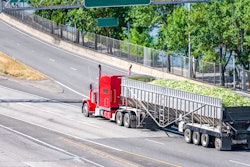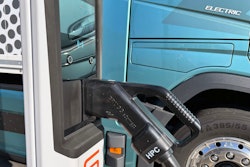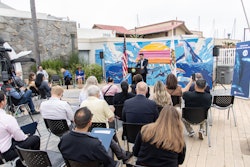Trucking news and briefs for Friday, July 12, 2024:
EPA hosting meeting, accepting comments on CARB’s Advanced Clean Fleets regs
The Environmental Protection Agency announced in a Federal Register notice publishing Friday that it will host a public meeting and open a comment period regarding a potential waiver to allow the California Air Resources Board to implement its Advanced Clean Fleets (ACF) regulations.
The ACF rule requires all new medium- and heavy-duty vehicles sold or registered in the state to be zero-emission by 2036 and requires all trucks to be zero-emission by 2042.
EPA said CARB submitted a request in November 2023 seeking a waiver of preemption for the on- and off-road regulations in the ACF rule. The waiver is required because the regulations exceed EPA’s requirements. EPA last year granted CARB a waiver for its Advanced Clean Trucks rule, which requires truck manufacturers to increase new truck sales to 55% (Class 2b-3), 75% (Class 4-8), and 40% of semi-tractor sales to be zero-emissions by 2035.
[Related: States challenge latest EPA, CARB truck emissions rules]
CARB said in its waiver request that it believes “no basis exists for the Administrator of EPA to find that CARB’s determination is arbitrary and capricious” under the Clean Air Act.
The Clean Air Act requires that the EPA administrator grant waivers “if the state determines that the state standards will be, in the aggregate, at least as protective of public health and welfare as applicable federal standards.” California is the only state that is qualified to seek and receive a waiver under CAA rules. The EPA is required to grant the waiver unless the administrator finds that:
- The determination of the state is arbitrary and capricious
- The state does not need the state standards to meet compelling and extraordinary conditions
- The state standards and accompanying enforcement procedures are not consistent with section 202(a) of the Clean Air Act
EPA is requesting public comment on California’s request, specifically on the three waiver criteria listed above. Comments can be filed here through Sept. 16.
A virtual public hearing will also be held Wednesday, Aug. 14, at 10 a.m. Eastern. It will end “when all parties who wish to speak have had an opportunity to do so.” Those interested in attending the hearing are asked to register by Aug. 7. Each commenter will have three minutes to provide testimony.
CARB’s ACF rule has been under fire from trucking industry and other groups with a number of legal challenges, including from the California Trucking Association, Western States Trucking Association, the American Free Enterprise Chamber of Commerce, and a coalition of 17 states and the Nebraska Trucking Association.
[Related: How California's Advanced Clean Fleets regs impact businesses]
Speed limiter block survives committee markup
A provision in the fiscal year 2025 DOT funding legislation that would block the Federal Motor Carrier Safety Administration from mandating speed limiters on trucks has cleared another hurdle.
The House Appropriations Committee on Wednesday voted to keep the provision in the bill after an amendment was proposed to remove it. The committee passed the funding bill with a 31-26 vote.
In addition to the speed limiters block, the bill also includes:
- $200 million in funding for truck parking projects
- A provision prohibiting the enforcement of ELDs on motor carriers transporting livestock or insects. Such operations are currently running under a statutory exemption from ELD requirements.
- A provision barring states from implementing trucking hours of service requirements that are more stringent than the federal standards, such as California’s meal and rest break rules
- A provision directing FMCSA to facilitate discussions with local, state and private sector stakeholders to develop guidelines for towing and recovery regulations at all levels of government
- The bill will now move to the full House, where it will need to pass before moving to the Senate.
In other appropriations action, the committee also passed a funding bill for the Department of Labor that includes a provision to prohibit the Department of Labor from implementing its independent contractor rule, which was finalized and took effect earlier this year. The funding bill passed by a 31-25 vote and will move to the full House.
OOIDA raises concerns over underride report
In a letter to Congressional transportation leaders Wednesday, the Owner-Operator Independent Drivers Association voiced concerns over recommendations and advice regarding underride guards on trucks submitted to the National Highway Traffic Safety Administration.
As reported Tuesday, NHTSA’s Advisory Committee on Underride Protection was split in its report, with a slight majority being critical of the agency’s efforts to date on safety related to underride protection, and a minority of the 16-member committee advocating for additional studies into the costs and benefits of side and front underride guards and stronger rear underride guards.
OOIDA’s letter to members of the U.S. House Committee on Transportation & Infrastructure and the Senate Committee on Commerce, Science & Transportation is critical of the committee’s work during its meetings discussing various underride topics since the committee was established.
“Over the course of these meetings, ACUP failed to work in a collaborative and consensus fashion,” OOIDA President Todd Spencer said in the letter. “Safety advocacy representatives manipulated their numerical advantage in Committee membership and approved a motion to define ‘consensus’ as a simple majority that minimized opposing viewpoints of other ACUP participants.”
[Related: Heated debate over recommendations for improving underride guard regulation]
Spencer added that “OOIDA warned that granting such an advantage to biased advocates would jeopardize the panel’s ability to achieve its mission of developing a concise, data-driven report that garnered consensus support among participants and stakeholders. ACUP’s brazen decision to redefine consensus as a simple majority validated our concerns and ultimately doomed this advisory process.”
The majority report in the committee’s larger report highlighted the advocates’ “shameless intention to ignore the Congressional directive to achieve consensus agreement,” Spencer said.
Regarding the recommendations offered by the committee, Spencer called them “a wish list of cost-prohibitive, unfeasible recommendations that were approved by a slim majority of ACUP participants. These motions merited substantive opposition and should not be used as a foundation for policy development.”
OOIDA also noted its concerns about mandating underride equipment, particularly side underride guards. “OOIDA has discussed operational challenges regarding rail-crossings, loading docks, and low ground clearances with Congress, as well as equipment damage resulting from curbs, roundabouts, speed bumps, and other highway features,” Spencer said. “These are all discussed at length within ACUP’s minority report.”
Ultimately, OOIDA said NHTSA should hold off on “potential new underride standards until further research, analysis, and testing is completed as directed in the Bipartisan Infrastructure Law. The only recommendations that garnered true consensus support among panel members generally involved enhancing research and reporting. As such, these are the only elements of the final report Congress and USDOT should take seriously.”










